Table of Contents
Get started with MyPerfectResume today!
- Build a resume on any device
- Pick an ATS-friendly template
- Tailor with AI copy suggestions
Why this resume works
- Quantifies accomplishments: Quantifying accomplishments like a 25% efficiency boost at Data Dynamics Inc. reveals the applicant’s significant impact.
- Illustrates problem-solving ability: The applicant makes their problem-solving skills evident by showing how they reduced reporting time by 50% at Insight Solutions.
- Highlights industry-specific skills: Highlighting industry-specific skills such as knowledge of advanced programming languages and expertise in developing data models shows a strong fit for technical roles.
More Student Resume Examples
Review these student resume examples to learn how to highlight your academic achievements, transferable skills, and part-time experience. Use these samples to help you craft a resume that stands out to potential employers.
Research assistant resume
Why this resume works
- Centers on academic background: The applicant’s education section builds a compelling case for strong academic foundations early in their career.
- Shows digital literacy: Using statistical software and data analysis tools efficiently showcases the applicant’s computer skills necessary for digitally-driven workplaces.
- Effective use of keywords: Including role-relevant terms such as “data analysis” and “project management” ensures the resume aligns with essential keywords for ATS success.
Teaching assistant resume
Why this resume works
- Includes a mix of soft and hard skills: By mixing technical skills like curriculum development and analytical abilities in student assessment with strong interpersonal skills, the applicant shows balanced expertise in the education field.
- Points to measurable outcomes: Facilitating group sessions that improved scores by 25% and mentoring literacy programs impacting over 200 students showcase a commitment to achieving measurable educational results.
- Demonstrates language abilities: Language skills in Spanish, French, and Mandarin support diverse classroom environments and cross-cultural education.
Tutor resume
Why this resume works
- Focuses on work history: Using a chronological resume, the applicant outlines a consistent career progression, showcasing roles that highlight growing responsibilities and effective contributions in education.
- Showcases impressive accomplishments: The job seeker’s ability to boost student performance by 20% and mentor junior tutors effectively reflects senior-level impact.
- Lists relevant certifications: With certifications like Certified Tutor and a TEFL Certification, the applicant shows their dedication to teaching excellence and continuous professional development.
Explore Even More Student Resumes
Student Resume Template (Text Version)
Yuki Williams
Albany, NY 12205
(555)555-5555
Yuki.Williams@example.com
Professional Summary
Results-driven data analyst with 9 years experience in business intelligence and technical expertise. Proven record of delivering insights and efficiency improvements in analytics.
Work History
Student
TechEd Academy – Albany, NY
July 2024 – August 2025
- Learned advanced programming concepts.
- Collaborated with peers on projects.
- Improved problem-solving by 40%.
Data Analyst
Data Dynamics Inc. – Albany, NY
January 2019 – June 2024
- Analyzed trends increasing efficiency by 25%.
- Developed data models, boosting insights by 30%.
- Guided team in adopting analytics software.
Business Intelligence Consultant
Insight Solutions – Buffalo, NY
January 2015 – December 2018
- Streamlined reporting, decreasing time by 50%.
- Led BI projects, raised client satisfaction 20%.
- Innovated dashboards enhancing visibility.
Languages
- Spanish – Beginner (A1)
- French – Intermediate (B1)
- German – Beginner (A1)
Skills
- Data Analysis
- Business Intelligence
- Problem Solving
- Project Management
- Programming Skills
- Team Collaboration
- Software Development
- Technical Writing
Certifications
- Certified Data Analyst – Data Science Council
- Project Management Professional (PMP) – PMI
Education
Master’s Computer Science
University of Illinois Urbana-Champaign, IL
June 2015
Bachelor’s Information Technology
Illinois State University Normal, IL
June 2013
Browse Resume Examples by Industry
- Aviation
- Banking
- Billing And Collections
- Biology
- Boating
- Business Operations
- Casino
- Chemistry
- Child Care
- Civil Engineering
- Compliance
- Computer Hardware
- Computer Software
- Construction
- Copywriting
- Cosmetology
- Costco
- Culinary
- Customer Service
- Dance
- Data Systems Administration
- Deloitte
- Dentistry
- Driving
- Education
- Electrical
- Electrical Engineering
- Energy
- Engineering
- Entertainment
- Entrepreneur
- Entry Level
- Environmental
- Environmental Science
- Event Planning
- Executive
- Fashion
- Film
- Finance
- Fitness And Nutrition
- Food Service
- Freelancing
- General Laborer
- Goldman Sachs
- Government
- Graphic Design
- Healthcare Support
- Hospitality
- Human Resources
- HVAC
- Industrial Engineering
- Information Technology
- Insurance
- Interior Design
- Inventory Management
- Janitorial
- Landscaping
- Language Services
- Law
- Law Enforcement
- Library
- Logistics
- Maintenance
- Marketing
- McKinsey
- Mechanical Engineering
- Mechanics
- Media And Communication
- Medical
- Mental Health
- Meta
- Metal Work
- Military
- Mining
- Museum
- Music
- Netflix
- Non Profit
- Nursing
- Pharmaceutical
- Photography
- Physical Therapy
- Plumbing
- Politics
- Production
- Program Manager
- Project Manager
- Psychology
- Purchasing
- Quality Control
- Real Estate
- Religion
- Retail
- Safety And Security
- Sales
- Sciences
- Shipping
- Social Services
- Special Education
- Sports
- Statistics
- Teaching
- Team Lead
- Tesla
- Training And Development
- Transportation
- Travel
- Veterinary
- Walgreens
- Walmart
- Web Development
Advice for Writing Your Student Resume
Diving into the job market as a student can be a bit overwhelming, but crafting a standout resume doesn’t have to be. Whether you’re applying for an internship, part-time gig, or your first full-time role, knowing how to highlight your unique skills and experiences on your resume is key.
Explore our tips on how to write a resume tailored specifically for students and discover how to effectively present your academic achievements and extracurricular involvements.
Highlight relevant certifications and training
Certifications and training can be important for students, especially when detailing your education section on a resume. These programs highlight learned skills and knowledge, making your application stand out. Training programs often introduce the latest methods and tools in your field, demonstrating your commitment to staying current with industry changes.
Creating a certifications and training section on your resume is a smart move for students. Place it after your education or skills so it’s easy to find. List any field-specific certifications to show you have extra training beyond regular courses. This section can help you get noticed by employers who value specialized knowledge.
Example of a certifications & training section for an IT student
Google IT Support Professional Certificate
Issued by: Coursera
Completed 2025
Introduction to Programming with Python
Issued by: Codecademy
Completed 2024
Need ideas for your resume? Browse our professional resume examples to find layouts and phrases that fit your style and job goals.
List your most relevant skills
As a student, having both technical and soft skills is important. Technical skills like knowing how to use software such as Microsoft Office, Google Workspace, or even coding languages is essential. Soft skills like communication, teamwork, and time management are just as important because they help you work well with others and manage your workload effectively.
Creating a dedicated skills section on your resume can be very helpful. In this section, list any software you know how to use and any unique abilities you have, like artistic talents or writing skills. This makes it easy for anyone reading your resume to quickly see what you are good at.
Also, try to mention these skills in the work experience section of your resume. For example, if you had a part-time job or volunteer experience where you used these skills, make sure to include that information. This shows that you have practical experience using your skills and makes your resume stronger.
A resume format that highlights education, skills, and any volunteer experience can help students make a strong impression.
Write a strong professional summary
A professional summary on a resume is like an introduction to hiring managers. It’s one of the first things they read, so it’s important to make it count. You can choose between writing a professional summary or a resume objective, depending on your experience and goals.
A professional summary is usually three to four sentences long and highlights your experience, skills, and achievements. It’s best for people who have some work experience because it shows what you bring to the table professionally. This section helps define your professional identity and lets employers know the value you offer.
On the other hand, a resume objective focuses on career goals. It’s ideal for entry-level workers, those changing careers, or people with gaps in their job history. While summaries show “what I’ve accomplished,” objectives focus on “what I aim to contribute.”
Next, we’ll look at examples of both summaries and objectives tailored for different industries and levels of experience.
Student resume summary examples
Entry-level
Recent Bachelor of Science in Computer Science graduate with strong foundation in coding, algorithms, and software development. Completed internships focusing on web development and data analysis. Skilled in Python, Java, and HTML/CSS. Eager to contribute technical expertise and problem-solving abilities in a dynamic tech environment.
Mid-career
Marketing professional with seven years of experience driving brand growth through strategic campaigns and digital marketing initiatives. Proven track record in social media management, SEO optimization, and content creation. Holds a degree in business administration and certifications in Google Analytics and AdWords. Recognized for innovative thinking and ability to engage target audiences effectively. Currently pursuing a master’s degree in AI integrations for marketing.
Experienced
Accomplished project manager with over 15 years of experience leading cross-functional teams in the construction industry currently pursuing advanced education to break into the finance industry. Demonstrated success in delivering large-scale projects on time and within budget while adhering to safety standards. Certified Project Management Professional (PMP) known for strategic planning, risk management, and fostering collaborative environments across diverse teams.
Student resume objective examples
Recent graduate
Driven recent graduate with a Bachelor of Science in Computer Science seeking an entry-level software developer position. Eager to apply coding skills and problem-solving abilities in a collaborative tech environment, while contributing to innovative projects and learning from experienced developers.
Current student
Passionate data analysis student, equipped with strong analytical skills and experience in tutoring. Looking to leverage educational background and analytical mindset to interpret complex data sets and support decision-making processes within a forward-thinking organization.
Entry-level applicant
Aspiring marketing associate with coursework in digital marketing strategies and hands-on internship experience. Seeking an opportunity to contribute creative ideas and social media management skills to a dynamic marketing team, aiming for growth through effective campaigns that engage diverse audiences.
Save time and make a great first impression with our AI Resume Builder that offers easy-to-use templates to highlight your skills and experience.
Showcase your accomplishments and projects
Listing your projects and accomplishments as a student can help your resume stand out. Highlighting projects where you applied your technical skills, worked in a team, or contributed to an impressive outcome all show what you can do. When listing your projects, give the project a name and describe what you did and the outcome you produced.
Awards, grants, and fellowships are worth including as well. These achievements demonstrate that others recognize the value of your contributions and their impact on your field. If you’ve secured major awards or received funding for research projects, incorporating those details will improve how potential employers perceive your credibility. This also reflects an active engagement in advancing knowledge through meaningful work.
Example of a projects section for a graphic design student
“Urban Echoes” Photography Exhibition
- Won second place in the annual student design competition.
- Developed a comprehensive brand identity for a photography exhibition, including a logo, posters, and digital marketing assets.
- The design was praised for its innovative use of typography and color, resulting in the design being used for the official promotion of the exhibition.
Brand Refresh for “The Daily Grind” Cafe
- Collaborated directly with the coffee shop’s owner to understand their vision and business goals.
- Designed a new logo, menu, and cohesive social media templates that reflected their brand’s cozy and modern atmosphere.
- The client reported a 15% increase in social media engagement and positive customer feedback on the cafe’s new visual identity.
Choose a resume template that features clear headings and easy-to-read fonts. Limit design elements to ensure your job skills and experience stand out without distractions.
FAQ
Do I need to include a cover letter with my student resume?
Yes, including a cover letter with your student resume is often advisable, as it gives you an opportunity to make a personal connection with potential employers.
A cover letter allows you to highlight your enthusiasm for the role and how your academic experiences align with the position’s requirements.
For instance, if you’re applying for an internship or part-time job related to your field of study, you can discuss specific projects or coursework that demonstrate relevant skills.
Consider using our Cover Letter Generator to craft a personalized document quickly—these tools offer step-by-step guidance and expert tips.
Additionally, reviewing various cover letter examples can provide inspiration and help tailor your letter to fit different roles and industries effectively.
How long should a student’s resume be?
For a student, a one-page resume is usually the best option since it focuses on your academic achievements, relevant coursework, internships, and any extracurricular activities. This format highlights your skills and experiences succinctly, making it easier for potential employers to quickly grasp your qualifications.
However, if you have extensive experience or notable projects that are highly relevant to the position you’re applying for, a two-page resume might be appropriate. Just ensure every detail you include adds value and directly relates to the job.
Feel free to explore more about how long a resume should be to tailor yours effectively as you progress in your career. Or, consider whether writing a CV is a better approach for your career goals at this stage.
How do you write a student resume with no experience?
Creating a resume with no experience requires focusing on your education, skills, and activities that reveal your potential. Highlight your academic achievements and any projects or extracurriculars that demonstrate relevant abilities.
- Emphasize education: Start with your current educational institution, expected graduation date, and any notable achievements like honors or awards. If you’ve taken courses related to the field you’re interested in, list those as well.
- Include extracurricular activities: Participation in clubs, sports teams, or student organizations can demonstrate teamwork, leadership, and other valuable skills. Detail your role and contributions in these activities.
- Highlight volunteer work or internships: Even if unpaid, these experiences can provide practical skills and show commitment. Describe what you did and what you learned from each opportunity.
- Showcase transferable skills: Skills such as communication, problem-solving, or time management are important for many roles. Provide examples of how you’ve developed these through school projects or personal initiatives.
By structuring your resume with no experience around these elements, you’ll present yourself as a capable job seeker eager to learn and grow professionally.
Rate this article
Student
Share this page
Additional Resources
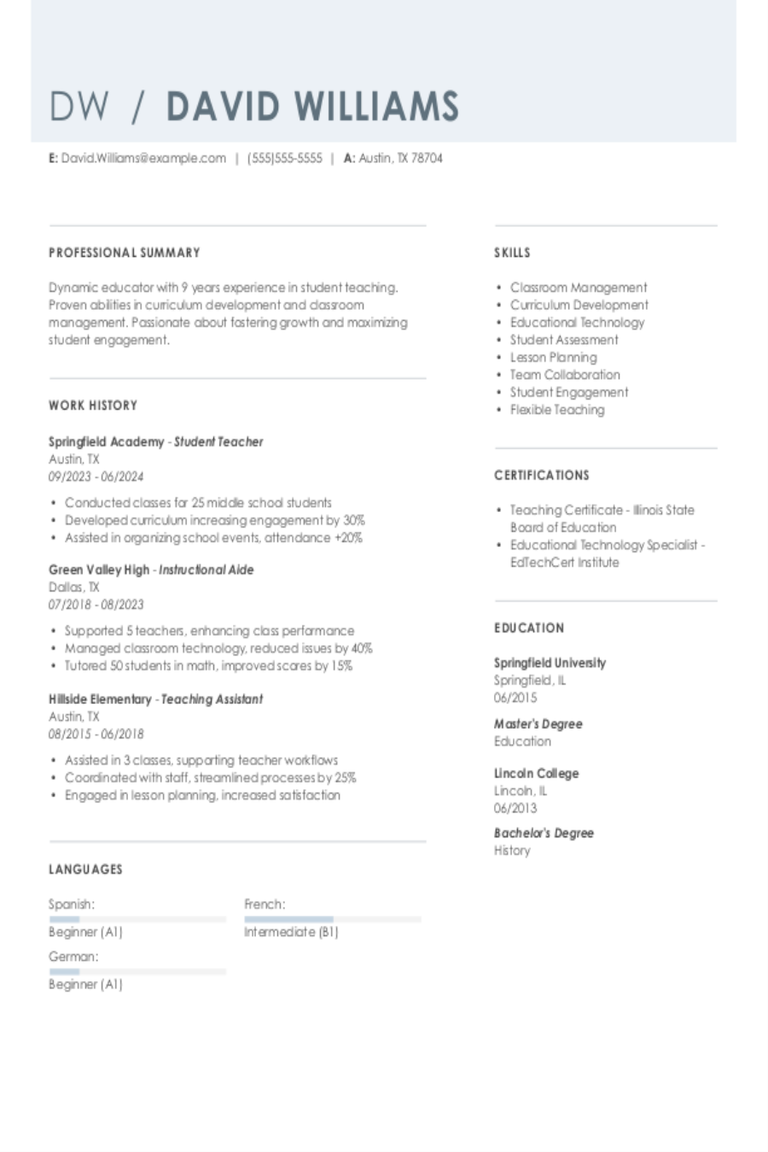
Student Teacher Resume Examples & Templates
Learn how student teachers can showcase classroom management and lesson planning skills. These resume samples and tips will help you highlight your teaching experience and passion for education.Build my resumeImport
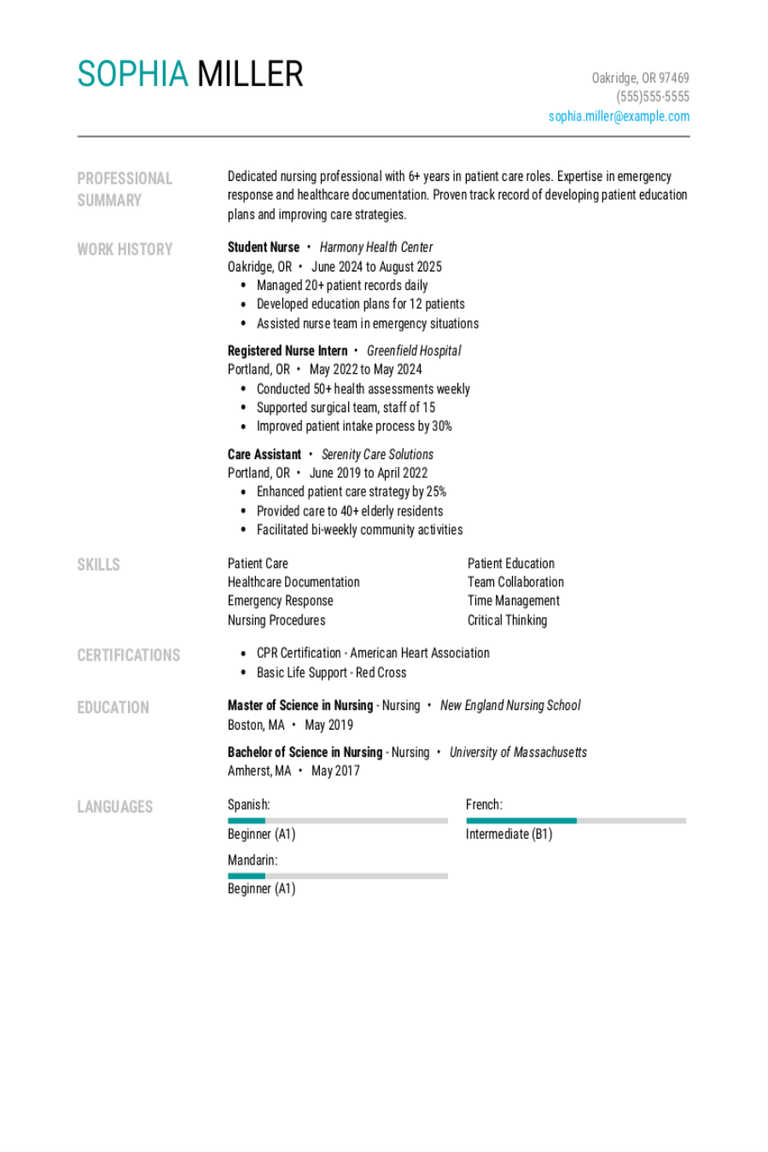
Student Nurse Resume Examples & Templates
Discover student nurse resume examples that show off patient care, teamwork, and time management. Learn how to present your skills and experiences to stand out in the healthcare field.Build my
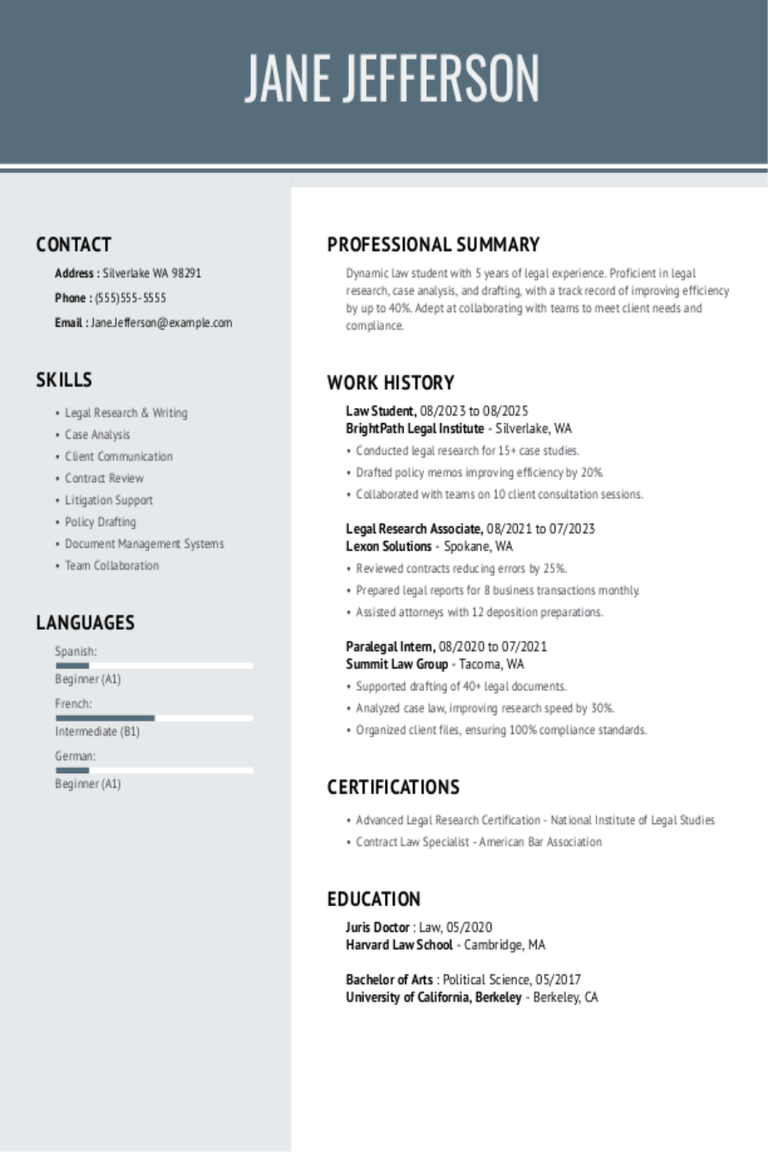
Law Student Resume Examples & Templates
See how law students showcase their research skills and legal knowledge in these resume examples. Use them as a guide to highlight your experience, internships, and passion for justice in
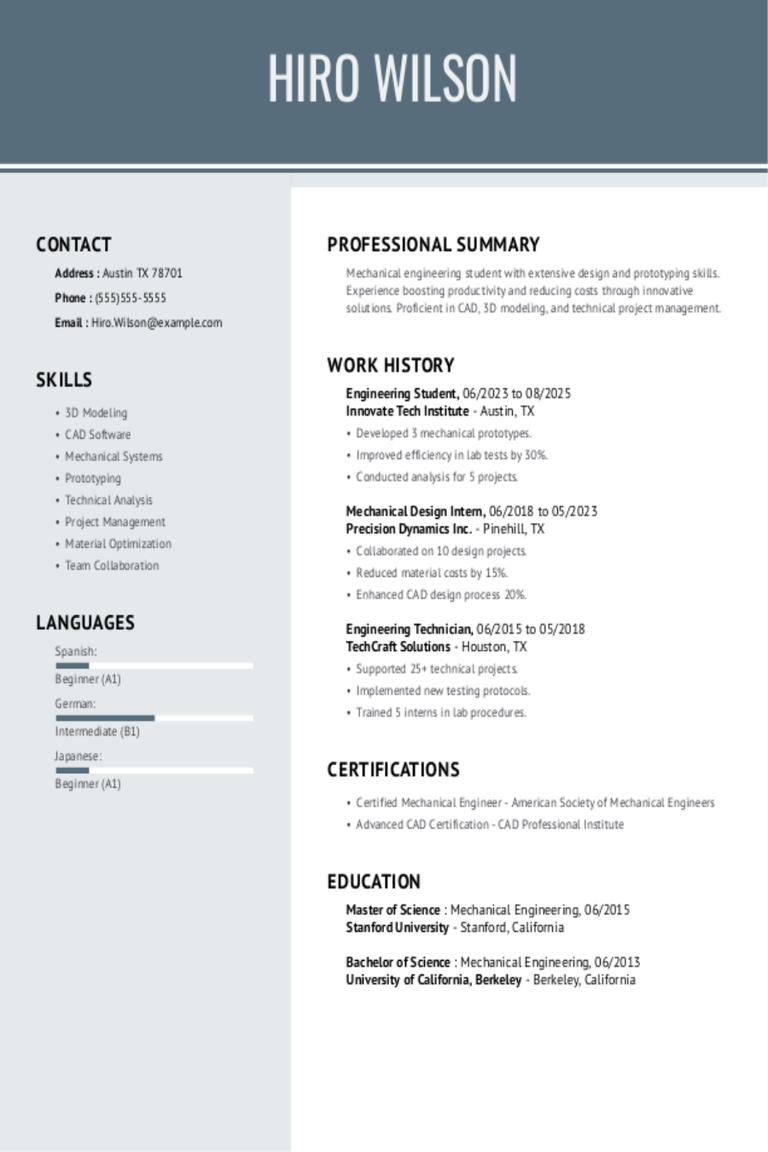
Engineering Student Resume Examples & Templates
Find engineering student resume examples that show how to list your technical skills and hands-on projects. Get tips to highlight internships, teamwork, and problem-solving experience for future employers.Build my resumeImport
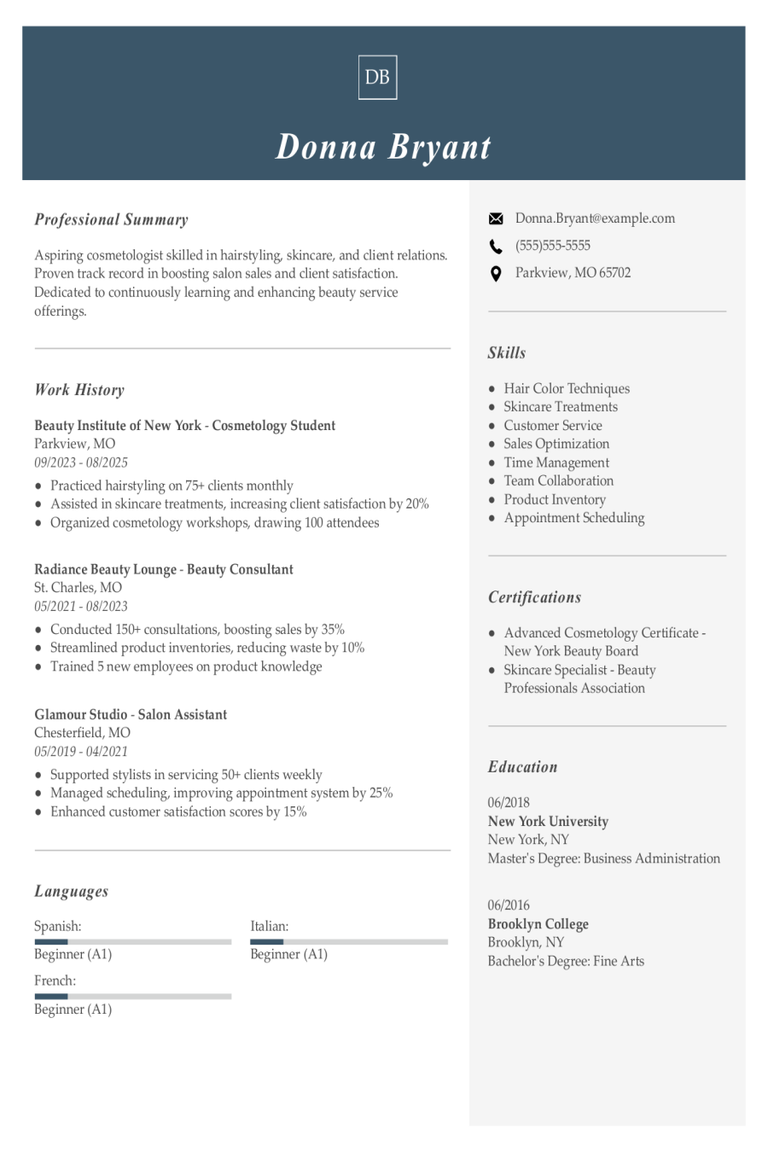
Cosmetology Student Resume Examples & Templates
Discover how cosmetology students can shine by showcasing creativity and customer service skills on their resume. Use our resume examples and tips to help you highlight your hands-on experience, product

